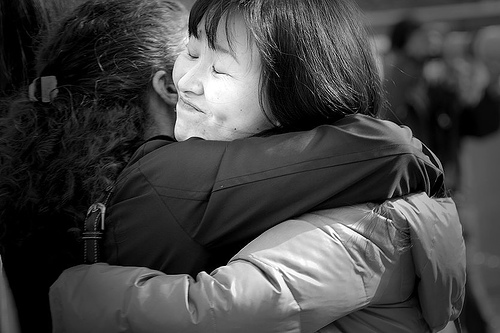Before moving to New England, I spent a year in Central America living and working with a group of foster children. These dear ones had seen too much for their years, too much pain, too much loss, too much betrayal. They had been hurt by those they should have been able to trust, and they bore physical and psychological scars—and some even babies—as a result. The walls of the home we shared echoed with a dichotomous union of hurt and hope, anger and love, violence and embrace, truth and falsehood, tears and laughter.
They often congregated around my kitchen table, drinking tea, eating freshly baked cookies, laughing, and talking about their days, their hopes, their dreams. On the wall was posted one of my favorite passages of Scripture, Isaiah 61, handwritten on green cardstock.
The Spirit of the Sovereign Lord is on me,
because the Lord has anointed me
to proclaim good news to the poor.
He has sent me to bind up the brokenhearted,
to proclaim freedom for the captives
and release from darkness for the blind,
to proclaim the year of the Lord’s favor
and the day of vengeance of our God,
to comfort all who mourn,
and provide for those who grieve—
to bestow on them a crown of beauty
instead of ashes,
the oil of joy
instead of mourning,
and a garment of praise
instead of a spirit of despair.
They will be called oaks of righteousness,
a planting of the Lord
for the display of his splendor.
They would stand silently reading it often, faces twisted in concentration as they worked out the words they didn’t know. Then they would turn to ask me about it—what did it mean; why did I have it hanging on the wall?
The number of times they had heard the Gospel was more than I could count. They could easily repeat what they had been taught: that Jesus loved them and came to die for them on the cross. It was repeated in some fashion nearly every time a “group of white people” came from the States to spend a week or two with them. It was presented at the church I attended with them each Sunday, always in a reductionistic turn-to-Jesus-to-make-your-life-better form. Some of them professed faith in and acceptance of Jesus. Some of them had tried it and bitterly turned away because Jesus didn’t answer their prayers, as they’d been promised he would.
But the form of the Gospel as we read it in Isaiah 61 was completely foreign to them. The Gospel in which Jesus meets us in our dark, messy, hurting places. The Gospel in which he doesn’t magically make them go away but walks with us through them. The Gospel in which Jesus came to buy us—and our world—back from the slavery of the pain, brokenness, loneliness, and betrayal they were all too familiar with. The Gospel in which Jesus could take the worst, ugliest, and most painful parts of our lives and transform them into something beautiful. This Gospel made their eyes grow big in astonishment. This Gospel surprised them. This Gospel actually spoke to their reality and offered hope in the midst of its confusion and darkness. And I pray it is the Gospel that rests in their hearts still.
Jesus himself used these words from Isaiah to announce his good news. In Luke 4, he reads them aloud in the synagogue and announces “Today this Scripture has been fulfilled in your hearing.” When Jesus first preached the Gospel—this was how he explained it. Perhaps we should follow his lead—to preach not only of how he redeems our souls but also how he redeems, restores, and transforms our bondage to freedom, our mourning to joy, our ashes to beauty, our despair to praise. This, friends, is a Gospel that should make our eyes grow wide. This is a Gospel that offers hope not just for eternity but for the here and now of our messy, broken world. This is a Gospel that will make our roots grow strong and deep, enabling us to rise as strong and steady as a giant oak in a storm. This, friends, is a Gospel that is beautiful.




